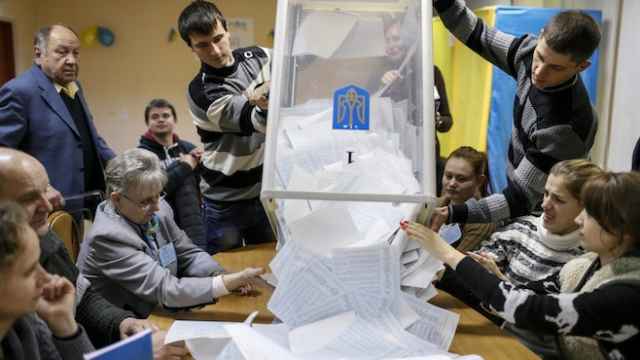KIEV — Pro-Western parties will dominate Ukraine's parliament after an election handed President Petro Poroshenko a mandate to end a separatist conflict and steer the country further out of Russia's orbit into Europe's mainstream.
Poroshenko held preliminary power-sharing talks with Prime Minister Arseniy Yatsenyuk on Monday after their political groups led other pro-Western forces committed to democratic reforms in sweeping pro-Russian forces out of parliament.
"The main task is to quickly form a pro-European coalition for carrying out agreements with the EU," Yatsenyuk said at a meeting with election observers.
International observers from the Organization for Security and Cooperation in Europe gave a further lift to the pro-Western Kiev leadership, saying Sunday's election had "largely upheld democratic commitments" despite the conflict in the east.
It was "an amply contested election that offered voters real choice and [had] a general respect for fundamental freedoms," Kent Harstedt, OSCE special coordinator, told a news conference.
But after months of conflict and turmoil there was no euphoria from Poroshenko's allies. The president faces huge problems: Russia opposes his plans to one day join the European Union, a cease-fire is barely holding between government forces and pro-Russian separatists in the east, and the economy is in dire straits.
Russian President Vladimir Putin can also still influence events, as the alleged main backer of the rebels in the east and through Moscow's role as natural gas supplier to Ukraine and the EU. He could also remove trade concessions from Kiev if it looks West.
Poroshenko's first task is to cement an alliance with Yatsenyuk's People's Front, which was running neck and neck with his bloc on about 21 percent support after more than half the votes on party lists were counted.
Ukrainska Pravda, an online newspaper, calculated that an alliance between those two leading blocs would still not give Poroshenko and Yatsenyuk a majority in the assembly. They are likely to turn to Selfhelp, a like-minded party with just over 11 percent of votes. Final results for party list voting and in single constituency seats are due on Oct. 30.
The tandem between the 49-year-old confectionery magnate Poroshenko and the professorial Yatsenyuk, who has gone out ahead as an anti-Russian hawk in recent weeks, was emerging as a relationship likely to dominate the new political scene.
Several commentators said Yatsenyuk, a favorite in the West for his stewardship of the war-ravaged economy, would probably remain prime minister to see through deep and possibly unpopular reforms, though he once called the job "political suicide."
The Kiev government says it is hoping for modest economic growth next year after a 6 percent decline in 2014, but the World Bank expects the economy to continue shrinking.
In line with measures agreed with the IMF, Yatsenyuk's government has cut budget expenditure and let the Ukrainian hryvna float. The currency has lost about 40 percent of its value against the dollar since the start of the year.
The economic decline has been aggravated by the fighting in the east, where the Kiev military said two Ukrainian soldiers were killed on Sunday as they tried to break through separatist lines in an armored vehicle to relieve a government checkpoint.
A Message from The Moscow Times:
Dear readers,
We are facing unprecedented challenges. Russia's Prosecutor General's Office has designated The Moscow Times as an "undesirable" organization, criminalizing our work and putting our staff at risk of prosecution. This follows our earlier unjust labeling as a "foreign agent."
These actions are direct attempts to silence independent journalism in Russia. The authorities claim our work "discredits the decisions of the Russian leadership." We see things differently: we strive to provide accurate, unbiased reporting on Russia.
We, the journalists of The Moscow Times, refuse to be silenced. But to continue our work, we need your help.
Your support, no matter how small, makes a world of difference. If you can, please support us monthly starting from just $2. It's quick to set up, and every contribution makes a significant impact.
By supporting The Moscow Times, you're defending open, independent journalism in the face of repression. Thank you for standing with us.
Remind me later.





